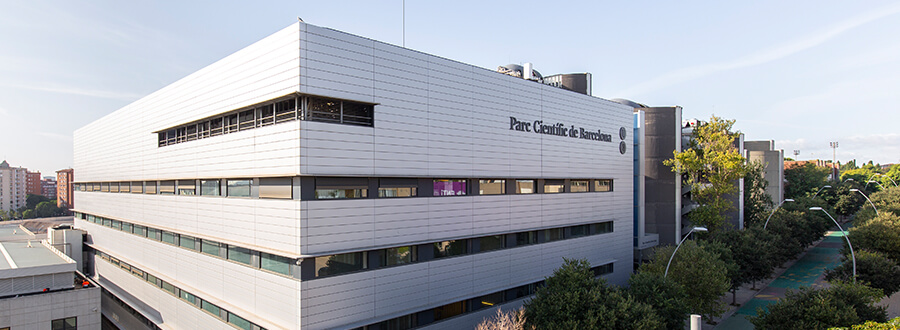
Hallmark Barcelona Science Park innovation
2021 was a key year for companies in the life sciences sector, as is clear in the results published in the Biocat Report. A considerable number of these companies are located at the Barcelona Science Park, an environment where entrepreneurship, academic research, cutting-edge R&D and venture capital find common ground to bring about social and economic development geared towards innovation in health.
The advances in research, funding and market access made by the companies that comprise the PCB community reaffirm the Park’s role as a catalyst for innovative activity and the transfer of knowledge and technology to society and consolidate its position as a benchmark ecosystem in Europe.
Financial muscle to advance
2021 was a key year for the consolidation of PCB community companies’ ability to attract private investment and other sources of funding. Of the total investment raised last year by startups in the BioRegion of Catalonia, €238 million according to the 2021 Biocat Report, over 16% was attracted by companies located at the Barcelona Science Park, with a joint total of €39 million.
At the top of the list of deals closed by members of the PCB entrepreneurial community in 2021 is InBrain Neuroelectronics, a spin-off of ICN2 and ICREA that is developing smart graphene-based neuroelectronic therapies to treat brain disorders. This deep-tech firm raised €14.3 million, the second-largest round of 2021 in the BioRegion and one of the biggest in the Spanish medtech industry, in an operation led jointly by Asabys Partners and Alta Life Sciences, with CDTI Innvierte and two international investors: Vsquared Ventures and TruVenturo GmbH.
The next on the ranking is IMIDomics, which closed a $16.5-million (about €14 million) Series A round led by US firm DNS Capital, with pharma corporation Brystol Myers Squibb, The Pritzker Organization and TAO Capital, among other investors. This spin-off of the Vall d’Hebron University Hospital-VHIR focuses on R&D for new drugs to treat immune-mediated inflammatory diseases.
Other noteworthy operations by companies at the PCB were carried out by Nuage Therapeutics, a spin-off of IRB Barcelona and ICREA that began working at the Park in 2021 to discover drugs for ‘undruggable’ therapeutic targets, which raised €3.2 million thanks to the funding contributed by the Asabys Partners Sabadell Asabys fund. Plus, Aelix Therapeutics, a spin-off of the Hivacat consortium working to develop a therapeutic HIV vaccine, raised €1.8 million from Caixa Innvierte Start, Ysios BioFund II Innvierte and CDTI Innvierte; Aptadel Therapeutics, a preclinical biomedical firm developing a new RNA therapy platform to treat cancer that moved into the PCB in 2021 after closing a seed round for €1.7 million ($2.1 million); and Pharmacelera, a deep-tech firm that is developing disruptive computational-chemistry solutions for drug discovery, which closed a €1-million crowd equity campaign with Capital Cell, surpassing their initial target of €800,000 in just two weeks. Finally, it is worth noting the €1.5 million MiMark was awarded through the EIT Health Wild Card programme for its WomEC project and to advance diagnosis of endometrial cancer.
Seven other companies at the Park secured investments under €1 million, for a joint total of €2 million to round out the grand total of €39 million.
2021 was also the year Gain Therapeutics, founded in 2017 by Swiss private investors and the TiVenture fund, went public on the Nasdaq. The biotech firm, which is developing next-generation pharmacological chaperones to treat rare diseases with their proprietary SEE-Tx technology (licensed to Catalan firm Minoryx Therapeutics), has its headquarters in Lugano (Switzerland) and its R&D department at the Barcelona Science Park.
Another notable operation, coming from public funds, is the €15 million loan that the CDTI granted to the biotechnology pharmaceutical company based in Amer (Girona) HIPRA for the development of its recombinant protein vaccine against Covid-19. The team that the multinational has at its PCB R&D center – where part of the research necessary for the design, generation and characterization of new vaccine antigens is carried out – is actively participating in the project. The vaccine is currently under continuous review by the European Medicines Agency, a step prior to marketing authorization. Also, GENESIS Biomed, a biomedical sector consultant specializing in early-stage R&D&i projects, helped in funding 3 rounds worth €3.8 million in 2021 through its Private Fundraising Service; In addition, its vehicle GENESIS Ventures invest invested €2.5 million in various startups and spin-offs, of which €90,000 correspond to last year. The company has created another vehicle to invest during 2022.
A success story in mergers and acquisitions comes from Infinitec Activos, an R&D-based company that commercialises active ingredients and delivery systems for the cosmetics industry and was acquired by Evonik, a Germany company present in over 100 countries with sales of €12.2 billion. After the acquisition, the price of which wasn’t made public, the company expanded its facilities at the Park to a total of 400 m², investing €500,000, and increased its staff 50%.
In terms of licences, Oncoheroes Biosciences, a start-up working on new therapies for childhood cancers, licensed the development and commercialisation rights for volasertib to US-based Notable Labs in 2021, holding on to the global licence for paediatric oncology.
Finally, Qiagen launched to market its QIAstat-Dx respiratory four-plex panel for the QIAstat-Dxtesting system, which identifies whether a patient has a standard seasonal respiratory infection (flu A and B, RSV) or SARS-CoV-2 in just one hour.
“In life sciences, it takes a long time, even years, and money to convert basic research into new products or services that reach society and have an impact on the health of all of us. However, we have many indicators that show how innovative projects are moving towards this destination, how they attract public and private capital, and successfully pass new preclinical and clinical phases and finally reach market. After 20 years of existence, the PCB has created a community of 3,200 professionals that demonstrates the fulfillment of these achievements, from the most basic research to innovation with new products and services”, explains Maria Terrades, director of the Science Park of Barcelona.
Diagnostic solutions and therapies advancing towards patients
Clinical studies are the essential final stage before new drugs, vaccines and diagnostic tools can be approved and launched to market. In advances with new drugs, Accure Therapeutics kicked off its ACUITY study in 2021, a phase II clinical trial on the ACT-01 neuroprotector in patients with acute optic neuritis; femtech start-up Oxolife started another phase IIa trial, OXOART-2, to assess the efficacy of its drug OXO-001 that targets embryo implantation to improve pregnancy rates; and SOM Biotech presented the results of its phase IIa trial on SOM3355, an innovative treatment for chorea associated with Huntington’s disease that has been granted FDA orphan-drug status and is currently in phase IIb in Europe. This is the company’s second product to reach the clinical phase
Regarding advances in vaccines, Aelix Therapeutics announced positive results from its AELIX-002 trial, a phase I/IIa clinical study on its therapeutic HIV vaccine.
Finally, in the field of diagnostics, GlyCardial Diagnostics finished recruiting for the EDICA trial, an international multi-site study that hope to validate its innovative in vitro diagnostic (IVD) technology to detect the Apo J-Glyc protein as a blood biomarker for early diagnosis of myocardial ischemia. Qiagen, for its part, conducted in 2021 clinical trials in European hospitals to obtain CE mark certification for its meningitis detection panel and clinical trials in US hospitals to be able to apply to the FDA for authorization of its gastrointestinal disease testing panel.
Cutting-edge research
In the very early stages, significant advances were made in the preclinical phases, which have not yet begun testing on humans. In collaboration with US company Galyan Bio, Chemotargets used its AI-based de novo drug design methods to create the first clinical candidate for Huntington’s disease designed using artificial intelligence; start-up Moirai Biodesign launched MoiRNAiFold, advanced software to design complex RNA molecules; Connecta Therapeutics finished the regulatory preclinical toxicology phase for its drug CTH120, which was granted EMA orphan-drug status to treat Fragile-X syndrome (FXS); and Oxolife also reached the final phases of preclinical development with its drug OXO-001 to treat infertility associated with Polycystic Ovary Syndrome (PCOS). Also in women’s health, femtech start-up MiMark has developed WomEC, a minimally invasive in vitro molecular diagnostic test for endometrial cancer, now in the prototype phase; and researchers at the Eugin basic research lab revealed that egg quality is related to cell mitochondrial activity, an advance that opens up a new path for addressing female fertility issues.
In children’s health, the Laboratoris Ordesa R&D centre carried out several studies to validate the capacity of the probiotics and prebiotics used in their baby formula to improve immune and gastrointestinal function in infants. Finally, also in 2021, Thai company SeriTech began an ambitious R&D programme at the Park to promote the medicinal applications of silk proteins and accelerate introduction into the pharmaceutical and cosmetics industries of an innovative transdermal delivery method for active ingredients.
New science and technical capacities
The Contract Research Organisations (CRO) located at the PCB remain strategic partners for biotechnology and pharmaceutical companies in the sector. In 2021, Enantia launched a Kilo Lab for development, scale-up and production of key intermediates and preclinical compounds; and Bioingenium, which specialises in the development of bioprocesses and production of therapeutic recombinant proteins, expanded its R&D facilities at the Park and acquired new protein fermentation and purification equipment to boost its capacity. Dan*na launched a pilot plant to scale up production of bioplastics and biomaterials to industrial levels for the biomedical and biotechnology sector. This start-up is among the top 5 in the world developing sustainable plastics according to StartUs Insights and was ranked among the 50 most innovative Spanish start-ups in 2021 by Emprendedores magazine.
For its part, Farmaprojects opened a GMP-certified lab to import and release drugs in the European Union; and Solitek, a CRO providing solid-state development services for pharmaceutical and biotechnology companies, also started activity at the Park last year.
Finally, it is worth noting Leanbio’s participation in the European Phoenix project to promote new nanotechnology-based drugs, with a budget of €14.5 million through the Horizon 2020 programme; and the collaboration between Cytes Biotechnologies and French firm CTIBiotech on the Hepnalysis project that is working to produce 3D bioprinted human liver models.




